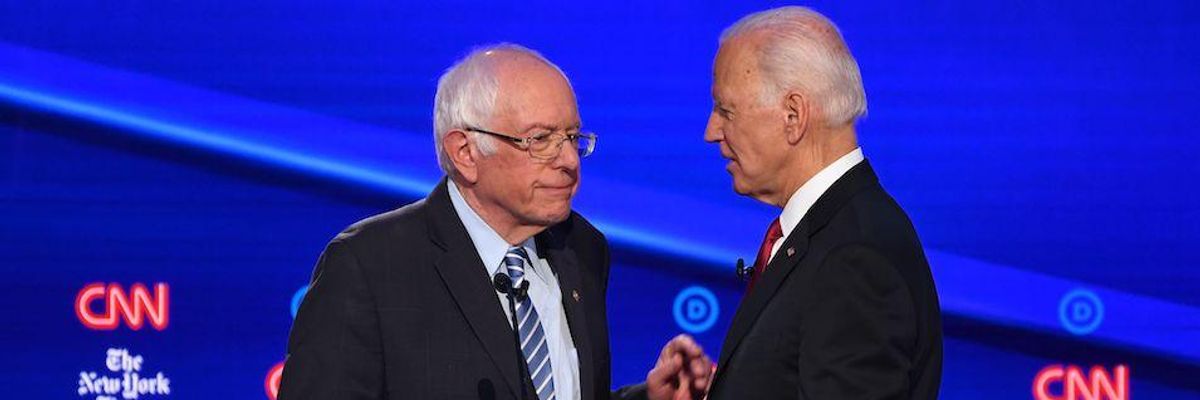Sen. Bernie Sanders' presidential campaign took aim at opponent Joe Biden Wednesday for giving tacit blessing to the formation of a super PAC, called "Unite the Country," which was officially launched this week.
"Joe Biden should get scorched on the next debate stage for starting a super PAC because he doesn't have grassroots support."
--Erick Fernandez, journalist
In an email to supporters Wednesday morning, Sanders campaign manager Faiz Shakir took issue not only with the name of the new Biden super PAC--calling it "a bad choice"--but also the kind of politics it represents.
"While there may be disagreements between candidates in this race about whether or not it's okay to have a super PAC," Shakir wrote, "on this issue the country is already pretty united: People have had ENOUGH of the wealthy and powerful buying our candidates and elections."
Paperwork for Unite the Country was filed Tuesday by former Biden aide Larry Rasky, a fundraiser for the former vice president whose emails asking for donations reportedly included in April the statement that Biden would "not work with a super PAC or take PAC money for his campaign."
As Common Dreams reported on October 24, despite Biden's past opposition to super PACs, the 2020 candidate reversed course when it became apparent his campaign was lagging in fundraising behind Sanders, Sen. Elizabeth Warren (D-Mass.), and South Bend, Indiana Mayor Pete Buttigieg.
"Joe Biden should get scorched on the next debate stage for starting a super PAC because he doesn't have grassroots support," journalist Erick Fernandez said on Twitter Wednesday.
But Biden, speaking on Tuesday to MSNBC host and wife of former Federal Reserve Chair Alan Greenspan Andrea Mitchell, said that the super PAC--where a small group of extremely wealthy individuals and corporations can dump unlimited amounts of cash for their preferred candidate, unfettered by maximum donations--was itself an example of "grassroots support."
"Here's what happened," said Biden. "There's been a grassroots response out there to the fact that Trump has gone out and decided to not only ask the Chinese and the Russians to make sure I'm not the nominee, but he has, his folks are spending an awful lot of money, he's raising a wole lot of money, they tell me there's been 10 milion spent on running ads against me, telling lies about me, and so this is an understandabale response from Democrats who desperately do not want to see him re-elected president."
"My guess is they would've done the same thing for anybody who was attacked in the Democratic primary if they were leading," Biden added.
During an interview Monday with The Real News, Norman Solomon--a frequent Common Dreams contributor-- said that the Biden campaign rationalizations for the support of the super PAC was yet another example of the former vice president's campaign priorities being out of step with the energy of the modern Democratic Party.
"I think the major factor for why Biden has gradually been falling in the polls is by the way that he campaigns and speaks and the contradictions in his claims versus his record," said Solomon. "And those contradictions are very much played out in his current effort to rationalize taking huge money or accepting the huge money going into super PACs on behalf of his campaign."
"The reality is, the real reason is that he's an AstroTurf candidate," Solomon continued. "He's up against two grassroots candidates, Elizabeth Warren and Bernie Sanders, who are not accepting money from super PACs, are not getting big bucks from corporate CEOs and hedge fund managers and so forth."
In comment to reporters Tuesday, Biden campaign manager Greg Schultz said that the former vice president was forced to accept help from the super PAC because of what Schultz implied was an unfair advantage by candidates with organic, grassroots support.
"Our campaign was at a disadvantage in that Joe Biden didn't walk in with his own email list," said Shultz. "Elizabeth Warren and Bernie Sanders, in particular, has built their email list at a national level for years and years with millions and millions and millions of dollars of investment."
And, as Biden ally Joe Cotchett--a major bundler for the campaign based in the Bay Area--told Politico, Biden's campaign isn't inspiring that kind of support from the public as yet.
"Does Joe have the ability to have 20,000 people at a rally right now?" said Cotchett, referring to Sanders' rally in Queens on October 19 that drew over 26,000 people. "The answer is no."

